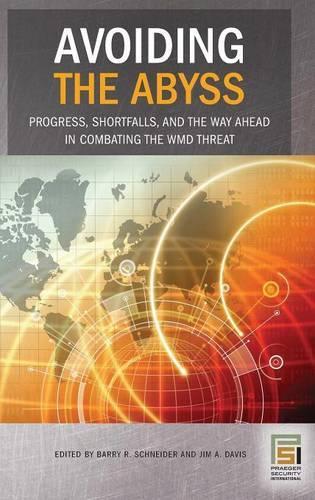
Avoiding the Abyss: Progress, Shortfalls, and the Way Ahead in Combating the WMD Threat
(Hardback)
Publishing Details
Avoiding the Abyss: Progress, Shortfalls, and the Way Ahead in Combating the WMD Threat
By (Author) Barry R. Schneider
Edited by Jim A. Davis
Bloomsbury Publishing PLC
Praeger Publishers Inc
30th May 2006
United States
Classifications
General
Non Fiction
327.1747
Physical Properties
Hardback
440
Width 156mm, Height 235mm
822g
Description
In December 1993, Secretary of Defense Les Aspin announced the Counterproliferation Initiative, a response to President Clinton's assertion that if we do not stem the proliferation of the world's deadliest weapons, no democracy can feel secure. This timely book brings together contributions from a wide range of experts to help readers understand how far the nation has come since thenand what still needs to happen. Insightful essays examine: arms control treaty programs; export control regimes; interdiction; diplomatic/economic/political persuasion and sanctions; deterrence; counterforce; active and passive defense; and consequence management. Many positive changes have occurred since 1993. Regime changes in Iraq and South Africa have removed some WMD proliferation threats. Saddam Hussein has been overthrown, and a new Iraq is beginning to emerge. South Africa's clandestine WMD program has apparently ended. Libya announced it has given up its efforts to have active WMD programs. The Taliban and al Qaeda have been routed in Afghanistan, probably delaying efforts to develop or buy WMD. Yet, states continue to develop and export WMD and/or their delivery systems. As many as 30 states are still believed to have either a nuclear, biological, or chemical weapons program. Some have all three. India and Pakistan have acknowledged programs. Abdul Qadeer Khan, the scientist who directed the Pakistani A-bomb program, has admitted selling nuclear weapons designs, and nuclear enrichment equipment to Libya, Iran, and North Korea. His colleagues have held discussions with al Qaeda representatives. Ayman Al-Zawahiri, number two in the al Qaeda chain of command, claims that the terrorist organization has several suitcase A-bombs from the Former Soviet Union. It appears clear to many that Iran has a desire to develop nuclear weapons. Syria still has a chemical weapons program. North Korea's WMD profile has escalated. As Avoiding the Abyss so convincingly demonstrates, much has been accomplished since the Counterproliferation Initiative was launched-but much work still lies ahead. It is an important story for every American.
Reviews
This volume is edited by one current and one former senior official at the US Air Force Counterproliferation Center. Contributors are former military personnel and analysts from conservative think tanks specializing in weapons of mass destruction (WMD) issues. The book comprehensively reviews the broad range of issues associated with addressing the threats posed by various types of WMDs. Appendixes and extensive footnotes also include considerable useful information regarding the evolution of policies to counter WMDs.Important for specialized collections on the military, but not a book for generalists. Recommended. General readers, lower-division undergraduates through practitioners. * Choice *
The editors and other contributors assess US efforts to prevent the proliferation of weapons of mass destruction (WMD) and explore outstanding issues, largely from a military perspective. Twelve essays discuss possible connections between WMD and terrorism, progress in military counterforce capability (the ability to target WMD infrastructure), missile defense, passive defense, consequence management, counter-WMD concepts of operation at US and allied air bases, and counterproliferation cooperation with allies. * Reference & Research Book News *
[A] top pick for college-level audiences studying military and political history and social issues. Essays focus on arms control treaties, programs, deterrence concepts, and risk management alike as they gather essays written by experts in their fields to help readers understand the threat and containment efforts of WMD. From implications of stealth and counteroffensive practices to passive and active defenses and homeland security issues, Avoiding the Abyss is a 'must' for any college-level reader. * Midwest Book Review - California Bookwatch *
Author Bio
Barry R. Schneider is Director of the USAF Counterproliferation Center at Maxwell Air Force Base and a Professor of International Relations at the Air War College. He is the co-editor with Jim Davis of The Gathering Biological Warfare Storm (Praeger, 2004). Jim A. Davis is Senior Program Manager at Battelle and former Deputy Director at the USAF Counterproliferation Center at Maxwell Air Force Base.
